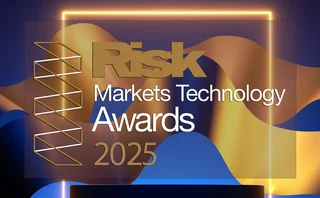
Market risk technology vendor of the year (specialist): CompatibL
Risk Awards 2017: XVA and reg specialist finds "perfect use case" for maths trick

When dealers started experimenting with adjoint algorithmic differentiation (AAD) for the pricing of counterparty risk in 2012, the potential of this mathematical trick quickly became clear: it was possible to dramatically speed up calculations without a huge investment in hardware.
Technology vendor CompatibL embraced AAD at the same time; a move paying off in spades as banks grapple with the demands of the Fundamental review of the trading book (FRTB) and the associated revisions to the credit valuation adjustment (CVA) framework.
"A sensitivities-based, standardised approach to computing regulatory capital is at the heart of both FRTB and FRTB-CVA. Traditional computational techniques are ill-equipped to handle the massive challenge of calculating risk sensitivities and AAD is likely to yield huge performance gains," says Nick Haining, chief operating officer at CompatibL.
The more risk sensitivities required as part of a calculation, the greater the performance advantage of AAD. Haining estimates the technique could yield an acceleration of between five and 10 times for FRTB calculations, while for XVA or FRTB-CVA, the speed-up could be as much as 100- to 500-fold.
Risk sensitivities would usually be obtained by 'bumping' inputs to a pricing system over and over again to determine the impact on the output value, but AAD uses the chain rule of differentiation to calculate those sensitivities simultaneously. With AAD, the computational cost of the entire calculation is fixed, regardless of the number of sensitivities.
Founded in 2003, CompatibL has built a client base of more than 50 institutions, including four of the largest derivatives dealers, as well as smaller regional banks, asset managers, central banks and supranationals. While it remains a specialist technology provider with a staff of around 200, it has found its niche in the proliferation of derivatives valuation adjustments (XVAs) over the past six years.
The vendor's core platform, CompatibL Risk, supports all major types of XVA, as well as regulatory calculations under Basel III, FRTB, FRTB-CVA, and the new standardised approach to counterparty credit risk (SA-CCR). Users of the platform say that while CompatibL may be smaller than the more comprehensive market risk system providers, its quantitative expertise is a big help in the current regulatory environment.
"CompatibL has been the bedrock of our XVA platform for several years and it has introduced cutting-edge quantitative solutions to real-world regulatory problems. We had our own ideas about XVA and were able to incorporate those features we wanted while also benefiting from CompatibL's experience," says Robert McIntyre, chief risk officer for global markets at Rand Merchant Bank (RMB) in Johannesburg.
In common with other CompatibL clients, RMB realised the potential power of AAD in supporting the computationally intensive CVA standard and asked the vendor to implement the technique for its internal analytics libraries last year. At the start of 2017, the bank had completed an initial round of testing and expects to go into full production in the coming months.
"Internally, we have limited human and computational resources, so we are relying on CompatibL," says McIntyre. "The further integration of CompatibL AAD into our in-house libraries should significantly increase our ability to calculate CVA sensitivities as we look to be compliant with incoming FRTB regulations as soon as possible."
AAD is not the only option for banks working on FRTB or XVA projects, but Haining believes it offers the most viable means of carrying out calculations on derivatives portfolios in real time, rather than having to wait for hours or even days for resource-intensive computations to complete.
"These calculations can feasibly be done in an overnight batch run, but the challenge is banks want intraday calculations so they can accurately determine pricing on a pre-trade basis and keep tabs on counterparty exposure. AAD is the best way to achieve this, and CompatibL was the first vendor to implement it in production for Monte Carlo XVA and risk," says Alexander Sokol, chief executive of CompatibL.
CompatibL started implementing AAD in 2013, and has now integrated it as the default option for calculating risk sensitivities in all of its commercial software, while the technique has also been installed within clients' own pricing and risk libraries. Many quantitative users now access AAD through CompatibL's open-source packages, which were released in 2015.
CompatibL has showcased the capability in QuantLib Adjoint, which combines its TapeScript open-source software and QuantiLib, the most widely used open-source library for quantitative finance. This was achieved by changing just a small fraction of QuantLib's original source code to enable AAD.
"From a market risk and CVA perspective, I can't think of a product that makes more sense or is more relevant in the current environment than what CompatibL has done – it's a really perfect use case for AAD," says Ferdinando Ametrano, co-founder of QuantLib and former head of quantitative research at Banca Caboto, part of Intesa Sanpaolo.
Only users who have a paid subscription or are part of a corporate subscription are able to print or copy content.
To access these options, along with all other subscription benefits, please contact info@risk.net or view our subscription options here: http://subscriptions.risk.net/subscribe
You are currently unable to print this content. Please contact info@risk.net to find out more.
You are currently unable to copy this content. Please contact info@risk.net to find out more.
Copyright Infopro Digital Limited. All rights reserved.
As outlined in our terms and conditions, https://www.infopro-digital.com/terms-and-conditions/subscriptions/ (point 2.4), printing is limited to a single copy.
If you would like to purchase additional rights please email info@risk.net
Copyright Infopro Digital Limited. All rights reserved.
You may share this content using our article tools. As outlined in our terms and conditions, https://www.infopro-digital.com/terms-and-conditions/subscriptions/ (clause 2.4), an Authorised User may only make one copy of the materials for their own personal use. You must also comply with the restrictions in clause 2.5.
If you would like to purchase additional rights please email info@risk.net
More on Awards
Clearing house of the year: LCH
Risk Awards 2025: LCH outshines rivals in its commitment to innovation and co-operation with clearing members
Best use of machine learning/AI: CompatibL
CompatibL’s groundbreaking use of LLMs for automated trade entry earned the Best use of machine learning/AI award at the 2025 Risk Markets Technology Awards, redefining speed and reliability in what-if analytics
Markets Technology Awards 2025 winners’ review
Vendors jockeying for position in this year’s MTAs, as banks and regulators take aim at counterparty blind spots
Equity derivatives house of the year: Bank of America
Risk Awards 2025: Bank gains plaudits – and profits – with enhanced product range, including new variants of short-vol structures and equity dispersion
Law firm of the year: Linklaters
Risk Awards 2025: Law firm’s work helped buttress markets for credit derivatives, clearing and digital assets
Derivatives house of the year: UBS
Risk Awards 2025: Mega-merger expected to add $1 billion to markets revenues, via 30 integration projects
Interest rate derivatives house of the year: JP Morgan
Risk Awards 2025: Steepener hedges and Spire novations helped clients navigate shifting rates regime
Currency derivatives house of the year: UBS
Risk Awards 2025: Access to wealth management client base helped Swiss bank to recycle volatility and provide accurate pricing for a range of FX structures







